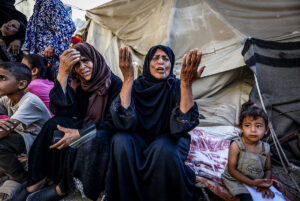Israeli society’s dehumanization of Palestinians is now absolute

Palestinians mourn the death of their relatives in an Israeli airstrike at the Al-Awda School in Abasan, east of Khan Younis in the southern Gaza, 10 July 2024
Meron Rapoport writes in +972 on 23 August 2024:
At 5:40 a.m. on August 10, the IDF Spokesperson sent a message to reporters informing them of an Israeli airstrike on a “military headquarters located in Al-Taba’een school compound near a mosque in the Daraj [and] Tuffah area, which serves as a shelter for residents of Gaza City.”
“The headquarters,” the Spokesperson continued, “was used by terrorists of the Hamas terrorist organization for hiding, and from there they planned and promoted terrorist attacks against IDF forces and citizens of the State of Israel. Prior to the attack, many steps were taken to reduce the chances of harming civilians, including the use of precision munitions, visual equipment, and intelligence information.”
Shortly after this announcement, shocking images from Al-Taba’een school circulated around the world, showing piles of dismembered flesh and body parts being removed in plastic bags. The images were accompanied by reports that around 100 Palestinians had been killed in the Israeli attack, with many more hospitalized. Most of those killed were in the middle of fajr, or dawn prayers, at a designated space inside the school compound.
It followed, as expected, a war of narratives developed over the number of civilian fatalities. The IDF Spokesperson published the photos and names of 19 Palestinians who it claimed were Hamas or Islamic Jihad “operatives” killed in the attack; many were given the label without specifying their alleged position or rank.
Hamas denied the allegations. The Euro-Med Human Rights Monitor also disputed the Israeli army’s information: the NGO found that some of the people on the military’s list had in fact been killed in previous attacks in Gaza, that others had never been Hamas supporters, and that some even opposed the group. The army later published an additional list of 13 more Palestinians that it alleges were operatives killed in the bombing.
While only an independent investigation can determine definitively the identity of all of the victims of the attack, the IDF Spokesperson’s initial statement is indicative of the dramatic change that Israeli society has undergone when it comes to the lives of Palestinians in Gaza.
The IDF announcement explicitly stated that the school “serves as a shelter for residents of Gaza City,” meaning that the IDF knew refugees had fled there in fear of the army’s own bombings. The statement did not claim that there was any gunfire or rocket attacks from the school, but that “Hamas terrorists … planned and promoted … terrorist acts” from it. Nor did it claim that the civilians who took refuge in the school were given any warning, only that the army had used “precision weapons” and “intelligence.” In other words, the army bombed a populated shelter knowing full well the deadly repercussions its assault would inflict.
As if starving millions was a hobby
It should come as no surprise that the Israeli media endorsed the IDF Spokesperson’s claims. When it comes to the resounding security failures that led to October 7, the Israeli media, and especially the right-wing media, is allowed to be critical and skeptical of the army. But when it comes to killing Palestinians, such skepticism is thrown out the window: in Gaza, the army is always right.
“In war, schools are off limits,” Prof. Yuli Tamir, Israel’s former education minister, wrote in Haaretz. “Isn’t there a single commander who will say, ‘No more?’” The answer is a resounding no. Every war entails a certain level of dehumanization of the enemy. But it seems that in the current war in Gaza, the dehumanization of Palestinians is close to absolute.
After every war in recent decades that Israelis have fought in, there have been public displays of remorse. This has often been criticized as a mentality of “shooting and crying” — but at least the soldiers were crying.
Following the 1967 Six-Day War, the hugely successful book The Seventh Day: Soldiers’ Talk about the Six-Day War was published, containing testimonies from soldiers trying to grapple with the moral dilemmas they faced during the fighting. After the Sabra and Shatila massacres in 1982, hundreds of thousands of Israelis — including many who served in the Lebanon war — took to the streets to protest the army’s crimes.
During the First Intifada, many soldiers spoke out about the abuse of Palestinians. The Second Intifada gave rise to the NGO Breaking the Silence. The moral discourse about the occupation may have been narrow and hypocritical, but it existed.
